The WFAA8 Communist clause (but from the '80s, not the '50s)
12/03/19 11:48
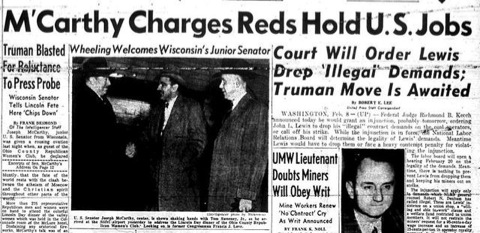
Note to readers: WFAA8 was at the height of its powers -- both quality-wise and ratings-wise -- when your friendly content provider learned that the station still had an “I am not a Communist” clause in its standard employee contract. At this point, in the early 1980s, the country was far removed from the Joe McCarthy-led “Red Scare” of the 1950s. So yes, it was a shock. And yes, station management didn’t at all like being confronted not only with proof positive that the clause still existed, but with allegations that they didn’t hire a prospective employee after he crossed the Communist clause out before signing his contract. This article was originally published on Dec. 16, 1981.
By ED BARK
@unclebarkycom on Twitter
An award-winning investigative reporter from Utah contends he was first hired and then dropped by WFAA-TV (Ch. 8) because he refused to sign a “loyalty oath” renouncing the Communist Party and other “subversive” groups.
But Channel 8’s management says the reporter in question, Karl Idsvoog, was turned away because he seemed to be a “prima donna” who wouldn’t conform to overall station policy. The Communist Party provision was not the determining factor, say General Manager Dave Lane and Executive News Director Marty Haag.
According to Idsvoog’s version, he was hired last August as executive producer of Channel 8’s Weekend Journal. He resigned his position as director of Salt Lake City-based KUTV’s investigative unit and waited for an employee agreement to arrive in the mail from Channel 8. When it came, Idsvoog said he signed it after crossing out several provisions that he found unacceptable. Haag then phoned and told him the deal was off, Idsvoog said. Among the provisions Idsvoog refused to sign off on are:
***“I certify that I am not and never have been affiliated with or in agreement with the Communist Party or any group designated by the attorney general as being Communist or subversive.”
***“If requested, I further agree to take a polygraph test either before or at any time during my employment with the company.”
*** “In the event of my employment with the company, I agree to comply with all rules and regulations established by the company and understand that failure to comply therewith may subject me to disciplinary action, including possible discharge.”
Idsvoog said he refused to sign the latter provision because in fact he couldn’t “comply with” the Communist Party and lie detector language in the contract agreement. (A copy of the agreement, signed by Idsvoog, was obtained from him.)
“There is no way I could accept that,” Idsvoog said in a telephone interview. “I hold no animosity whatsoever toward Marty Haag and Channel 8. It seemed like a very solid, fine operation. They have their right as a company to demand certain things of employees. I chose to reject them. It’s a matter of principle. I am not and never have been a Communist. But supposedly we have some First Amendment rights in this country. I showed it (the Communist Party clause) around the office here and we sort of joke about it. My God, we found a place that’s more conservative than Utah. I was under the impression that Joe McCarthy died, but evidently he moved to Texas from Wisconsin.”
A spokesman for the U.S. attorney general’s office said the “subversive” clause in Channel 8’s contract is outdated.
“The list was abolished in 1974,” the spokesman said, referring to Channel 8’s language concerning “any group designated by the attorney general as being Communist or subversive.” The federal government had kept such a list from 1947 to 1974.
There also is a state statute regarding “loyalty oaths,” but the law is “no longer enforced” after being held “constitutionally invalid” by a 1967 U.S. Supreme Court decision, a spokesman for the state attorney general’s office said.
However, a private company “can do what it pleases” regarding contract language, the spokesman said.
John McKay, Channel 4’s general manager, and Bill Vance, news director at Channel 5, said there are no “loyalty oath” or lie detector clauses in their company contracts.
Dick Williams, a news director for 10 years and now a newspaper editor in Atlanta, said: “I’ve seen hundreds of contracts, but never anything like that (Channel 8’s). That’s unheard of.”
Williams was interviewed at the recent Radio-Television News Directors convention in New Orleans.
“I’ll be honest with you. I didn’t even know it was there,” Channel 8’s Lane said of the “subversive” clause. “If I had known he’d (Idsvoog) crossed that out, I would have wanted to discuss things further with him. If he was known to be actively involved with the Communist Party, I’m not sure I’d want him working at this station.”
Lane said Channel 8’s employee agreement was reviewed 15 months ago. At that time, the subversive clause was left in and the lie detector clause was added. The lie detector clause represents protection for the station against equipment theft, he said.
Haag claimed Idsvoog would have been hired if he had crossed out only the subversive clause.
“What Karl wanted was to be was his own boss,” Haag said. “The Communist Party thing was not the line in question. I didn’t care whether he lined through that clause or not. If he had not negotiated the way he did, if he had not lined through that thing on company policy, it wouldn’t have made any difference to me. I told him I need to find somebody who wants to work here more than he did. After a while, you begin to get vibrations about people. He has a helluva reputation as a reporter, but so does Reggie Jackson as a right fielder. I’m not going to hire a prima donna.”
“When I looked at all the things he had crossed through, I said that’s not the kind of guy we want to hire here,” Lane added. “He said the subversive clause had never before been questioned by prospective or current Channel 8 employee.
Idsvoog, the reporter who did balk, has signed a new contract with KUTV, Salt Lake City’s NBC affiliate. His previous investigative work has earned him duPont and Iris awards for excellence.
“If I didn’t have to sign a loyalty oath, I would certainly consider going to work there again,” Idsvoog said.
There apparently is no chance of that.
Email comments or questions to: unclebarky@verizon.net
Perry Como's last Christmas show for ABC -- up close and personal
15/12/17 12:43
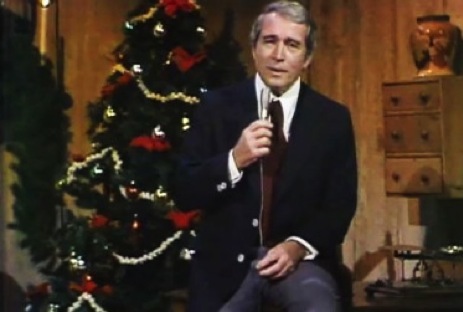
Note to readers: The late Perry Como’s last ABC Christmas special aired in 1986. As a kid, your friendly content provider endured his annual holiday presentations. Later in life, I came to almost revere them, particularly his closing anthem, “Ave Maria.”
Conveniently then, the climactic ABC special was taped in San Antonio, making it relatively easy to arrange a visit and companion interview with Como, who was 74 at the time and died on May 12, 2001 at age 88. Here’s how it went. This article originally was published in November 1986.
By ED BARK
@unclebarkycom on Twitter
SAN ANTONIO — It’s nearly noon on All Saints Day, and Perry Como`s fans are filing into the San Fernando Cathedral, awaiting a religious experience that, for them, transcends any celebration of a mere holy day.
Perry Como, who turned an ageless 74 in May, has taken his front pew seat next to actress Angie Dickinson. This is the first day of taping for the venerable and venerated Como’s 33d Christmas special. Director-producer Bob Wynn, whose next assignment is a horror film being made in Rome, has been selected to call the shots for what folks on the set call a “sacred institution.”
Wynn quiets the congregation, cues the cameras and shouts “Action!”
Como rises to the occasion, stepping from the pew as the introductory choir music is played for his newest, pre-recorded version of “Ave Maria.”
“Ahhhh-ah-vey Mah-REE-ee-ee-ahhh. Grah-see-yeah play-ay . . . Cut!” Como, caught in a momentary reverie, has missed his lip-sync cue.
Unperturbed, he smiles and gently asks his cue-card man to be a little quicker on the draw. There is no loss of dignity, no sullying of the song that has become Como’s anthem as well as an automatic tear-jerker for the many who revere him as their host of Christmases past. This is Como’s crowd, already warmed by his bantering and unflagging good fellowship. Nothing can spoil the day.
“The audience knows I’m not going to do anything after all these years to upset them,” Como says to an observer. “We haven’t changed the specials a lot. Sometimes we feel that maybe we should change, but what do you do? How do you change Christmas music? These are more like prayers, you know.”
On take two, Como gets halfway through “Ave Maria” before it’s noticed that one of his shirt buttons is undone. A wardrobe man hurriedly re-buttons it before Como cracks, “See all this pampering now? I go home and my wife says, ‘Take out the garbage.’ “ His soft voice projects the joke only as far as the third row.
The third try is the keeper. Como’s longtime musical director, Nick Perito, is crouched a few steps in front of his boss, silently and expressively urging him to give his heart to the song. A young crew member, perhaps one-third Como’s age, stands transfixed, his face softened by an unwavering smile. The cathedral is dressed in holiday decorations, Como`s fans are being blessed. For these admirers, it seems, Christmas will almost be an anticlimax this year. They have spent their holiday with Como.
Having said amen to another “Ave Maria,” Como is in his trailer, resting before the short drive to the afternoon’s taping at the San Jose mission. He has quickly shucked his dress shirt, tie and light gray suitcoat for an outfit that more befits his “Mr. Relaxation” image. This sportier Perry wears a green-and-brown striped shirt and a green windbreaker. He thinks back to the 1984 Christmas special from London, which proved to be a crushing blow to fans. Como ended the show on a sour note, namely “O Holy Night” in place of “Ave Maria.” How could he?
“I caught hell for it,” Como says. Never again, he pledges.
“Ave Maria,” the Shubert version, remains the most requested tune whenever Como sporadically hits the concert stage. This is where he takes a stand.
“I refuse to do it, and I tell them it’s not the place or the time to do it,” he says. “Some of them understand, and some of them don’t. I just can’t see doing it in a theater.”
The version of “Ave Maria” to be heard at the close of the San Antonio special had been recorded two days earlier in a Los Angeles studio. All of Como’s solos are handled this way, even though he says, “I’m a terrible lip-syncer. We all know it, and I know it.
“But you know,” he adds, “you may come up empty, with this kind of voice. I’ve done a Christmas show where I couldn’t even talk. It`s a protective measure.”
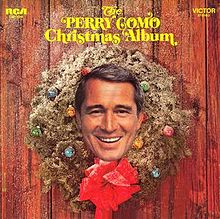
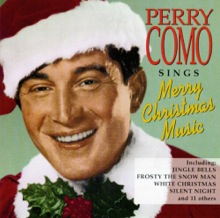
During the recent shooting schedule, Como and crew covered most of the principal San Antonio tourist attractions, including the Alamo. Como crooned with the San Antonio Symphony and with an Air Force choir. ABC will telecast the special on Saturday, Dec. 6, with Como joined by guest stars Dickinson, country-and-western singer George Strait and mezzo-soprano Julia Migenes-Johnson. Of Strait, he says, “I must admit that I’ve never heard him sing, but they say he’s well-liked.”
During his “Dream Along With Me” days, Como turned out 39 shows a season for NBC. When “The Perry Como Show” ended in 1963, he starred in frequent “Kraft Music Hall” specials until 1967.
“Now I’ve got it down to one show, and I’m trying desperately to get it down to a half-hour,” he says. “No, I’m only joking. I get a kick out of these things. I really do.”
But Como says there`s no business like yesterday’s show business.
“I used to enjoy it a lot better when they were live,” he says of the Christmas shows. “See, now what we’re doing is a movie in an hour. And I might say that some of them are pretty bad movies. You just don’t have the time. Something like this you should take months to do, and do it properly. You don’t get a chance to see too much of San Antonio. I think that’s wrong.”
This year’s show will be “more of a people’s Christmas,” explains director Wynn, noting that Como “had never really sung ‘Ave Maria’ with a churchful of people.”
“We’re getting down to the people and touching them, and watching for their reactions,” Wynn says.
During the taping at the San Jose mission, Wynn even has Como chasing after a runaway goat during the “Bless the Beasts and the Children” segment. Como sheds his coat, half-runs a few steps and then quits, throwing his hands up in mock resignation.
Dickinson, who last held hands with Como during his 1982 Christmas special from Paris, describes him as “quite like heaven. He’s just so sweet and considerate, easy, laid-back, talented, beautiful.”
Como shrugs off any adulation flowing his way. ”Well, I just let them form their own opinions,” he says. “It’s a kick to me, you know. You see some of these elderly people and they say, “Oh God, I’ve been watching you for 50 years.’ And it’s true!”
Como and his wife, Roselle, whom he married in 1933, have two sons and a daughter and live in semi-retirement in Jupiter, Fla. Reared in Canonsburg, Pa., Perry is one of 13 children born to the late Pietro and Lucille Como. Pietro supported his family as a mill hand employed by the Standard Tin Plate Corp. Perry ran his own barber shop for five years until successfully auditioning for the Freddie Carlone Orchestra in 1934.
His mother was a “wonderful” woman from the “old, old school.”
He tries to continue, but his fans keep on trailing him.
“You’re my era,” says a middle-aged woman getting around on crutches.
“I’m everybody`s era,” Como says, signing a dollar bill for her.
Another fan brings a collection of song sheets from the 1940s, including the big Como hit, “Prisoner of Love.”
“The lover boy of the stone age,” Como quips.
He signs a blood donor card and a little boy’s shirt pocket. He obligingly takes a picture with a fan. Small children are patted on the head and adults get a wink, a grin or a one-liner. Como cradles babies in his arms. He applauds everyone, whether it’s the equally gracious Dickinson or a priest offering a prayer during the taping in San Fernando Cathedral. Fans are ecstatic. Their hero stands taller than even they had imagined.
As TV audiences watch him sing “Ave Maria,” however, he will not dominate the screen; the camera will pan to views of the cathedral interior and the happy crowd.
“It’s a song that makes people think a little,” Como says. “So they’re going to show the beautiful paintings and so on.
“People,” he adds, “don’t want to see some joker up there for the whole song.”
Email comments or questions to: unclebarky@verizon.net
The Palm closes in Dallas, but a scrumptious interview with Robin Leach lives on
29/06/17 14:31
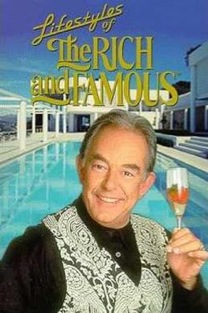
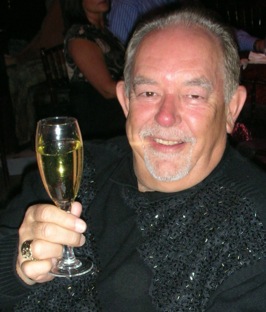
Note to readers: The downtown Dallas edition of The Palm restaurant is closing on Friday, June 30th after a 33-year run dating to May 1984. Your friendly content provider didn’t get there very often because, well, the prices. But just over a year after The Palm opened, I had a still unforgettable lunch interview with Robin Leach, who was perfectly comfy with the high-cost menu. He was in the heyday of his signature show, Lifestyles of the Rich and Famous, which ended up enduring until 1995. Leach proved to be a delicious fount of gossip and pointed quotes, which is the way I’ll always remember The Palm. This article was first published on July 17, 1985.
By ED BARK
@unclebarkycom on Twitter
Robin Leach is in Antigua, bawling loudly in that whiny cockney accent about “the ultimate playpen in paradise for the rich and famous!”
You’d need a butcher knife to cut through the goo.
“It was good to see ‘Lizer’ again,” he says, speaking of “old friend” Liza Minnelli.
You’d need a hacksaw to cut through the glop.
“She’s the star who gave it all up for love -- and is now right back in the swim of things!” This time Leach is talking about Esther Williams.
You’d need a bloody chain saw to cut through the effervescence flowing through each and every edition of Lifestyles of the Rich and Famous.
Leach nods agreeably from a table at The Palm restaurant, where the walls are thick with drawings of national and local celebrities. He has the shape of a Gummi Bear and a nose for gum-drop gossip. Sure, The Love Boat is hard-edged drama compared to Lifestyles.
And you know what?
So what.
“The show is fluff,” Leach says. “I take no umbrage when critics say we’re 60 minutes of bubble gum. Absolutely! But it’s the best bubble gum on television. It’s the best fluff on television. It’s the best champagne and the best silk sheets on television.”
It’s winning its time slot here every Sunday at 11:30 p.m., when Channel 5 draws 25 percent of late-night viewers to the spectacle of Leach interviewing Julio Iglesias and then saying, “Julio Iglesias, truly a conquering hero!”
“Johnny Carson has called me a toady,” Leach volunteers. “A lot of people have said that my last name fits the job that I have to do. But all I ask is that you remember the title of the show. It’s Lifestyles. If it was ‘crucify’ or ‘attack’ the rich and famous, I’m quite capable of doing that.”
Some of the rich and famous at first were reluctant to let the former tabloid reporter show America their boardrooms, bedrooms and bathrooms. During the first four months of the show, which premiered in March 1984, Leach says, he called on a lot of “semi-friends” to help get things rolling. Now Lifestyles is in 165 media markets. Stars are standing in line to be petted.
“Some of them thought it was going to be an expose of the wealth and waste and the conspicuous consumption,” he says, “and that it would come complete with editorial comment condemning this horrendous misuse of money. But we didn’t. Nobody appointed me judge or jury.
“I also believe that stars are made by the public, so why destroy the very person that the public wants to be a star in the first place? People want to see celebrities. And nobody has ever come on television before, I don’t think, showing celebrities getting out of bed or getting out of bathtubs or taking showers. But people want to see whether the bathtub is 20-carat gold. They want to see whether the sheets are silk. They want to see whether they sleep nude or in pajamas. You see that on our show. We’ve done it.”
Well, sort of. Dallas native Morgan Fairchild trusted Leach to the point where she willingly got into a bathtub for him while his cameras recorded the moment for Lifestyles. Sensational? Yes, says Robin. Scandalous? No. It was all in good taste, after all, and viewers didn’t see any more of Morgan than they could by watching her between the sheets in a prime-time potboiler. But the very idea of Morgan taking a bath while Leach bubbled -- why, it’s . . . sensational!
“I am a great believer,” Leach says, “that you can be sensational without being scandalous.”
He explains the difference.
Years ago, while interviewing actress Susan Anspach, he learned from her that she had two “illegitimate” children, one by actor Jack Nicholson.
Leach says he “broke” the story, but in a nice way.
“Instead of saying Jack Nicholson is a creep for having this baby, it was about why single motherhood can be important and can be beautiful,” he explains. “It was a sensational story, but it wasn’t scandalous.”
Leach was in Dallas to do a piece on T. Boone Pickens, the nationally known corporate raider. Leach gets to Texas fairly often. During the show’s first season, for instance, viewers were given a tour of Midland, home of “more millionaires per square mile than anywhere in the world.”
Texas has a “tremendous amount of the nouveau riche wealth in America,” Leach says. “I say it with love and affection that Texans know how to earn money and they spend it just as hard as they work to earn it. So it’s a perfect stomping ground for me, because they do like their diamonds and their big houses and their chauffeur-driven limos.”
A native of Harrow, England, Leach was weaned on British tabloid journalism before coming to the States, at the age of 21, in November 1963. His first job, during the Christmas rush season, was in the shoe department of a New York department store. He worked six months as a reporter for the New York Daily News before quitting to freelance for a variety of publications, including the National Enquirer and Star tabloids.
His first experience in television was frequent guest shots on The Mike Douglas Show. He became a regular on Vidal Sassoon’s short-lived Your New Day program, reported Hollywood news for New York- and Los Angeles-based morning talk shows and worked with CNN for 18 months on a show called People Tonight.
His self-described “bizarre voice of mine” went nationwide on Entertainment Tonight, on which Leach seemingly attended every New York party and then gushed about it. He left E.T. in August 1983 to get Lifestyles in shape for production by his own Leach Entertainment Features. He also produces Steve Allen’s The Start of Something Big, which premiered in April and is carried here at 5 p.m. Sundays on Channel 11.
There is a message, Leach contends, behind the swimming pools, movie stars and other gilt trips presented weekly on Lifestyles. The message was spelled out in a recent “Rags to Riches” segment about millionaire developer Ken Behring.
“Dedication pays big dividends,” Leach said after Behring had showed off his mansions, his antique cars and his personal wine taster.
Lifestyles is “wrapped up in 18-karat gold sugar,” Leach says, “but underneath is a pill. It says if you work hard and if you pull up your socks and you get off your backside, there is no reason why in America you cannot have the same. That applies to every income level and every ethnic group in this land.”
America must fight, he says, for truth, justice and the filthy rich.
“There is absolutely nothing wrong in being rich or being successful,” Leach preaches. “If it wasn’t for the rich people in America, half of your hospitals wouldn’t exist. Rich people should never be condemned for their wealth. I come from a country where socialism was proven not to work. I come from a land of handouts to people who won’t work. And what happens is that the poor soak the rich, so that the rich are no longer rich. And then the poor don’t have anybody to get money off.”
That said, Leach says he would “love nothing more” than to host a program called Lifestyles of the Poor and Unknown. A pity, he says, that such a show would have “the lowest ratings in the world.”
“So if there’s any blame to be laid at the feet of what television is in this country,” he says, “it’s the viewers themselves, totally.”
Leach’s lot in life, then, is to traipse through Antigua and other assorted play lands and palaces. “Silk pajama journalism,” as he calls it, can be found almost anywhere a star is living the life expected of him or her. There are holdouts, though. Meryl Streep, Robert De Niro, Al Pacino -- they’ll never let Robin magnify their lives. Robin doesn’t care, either.
“They’re boring,” he says. “First of all, these people don’t talk, which is very important. Those people mumble. Those kinds of people can’t express themselves. They can’t put sentences together. They can’t deliver good conversation unless they’re memorizing the lines written in somebody else’s script.
“The people who share themselves with the public last a lot longer than the people who don’t,” he contends, using Joan Collins as an example. “I don’t think the same charismatic excitement exists today about Robert Redford, whom you rarely hear about. You think of all these legendary names like Meryl Streep, De Niro, Pacino. I hate to say it, but they are not blockbuster box office.”
Leach say he has had only one uncomfortable scene with a star in 25 years of covering show business. In this case it was a star made by Leach, whose “world exclusive” interview with Margaret Trudeau was an international sensation. Leach’s story, which he says he censored, nonetheless included “fairly lengthy anecdotes about the night she slept with 21 men.” Four months after the interview was published in People, The Star and other magazines, Leach and Trudeau met again at New York’s Studio 54 disco.
“She came over to me, she slapped my face and she drove a six-inch stiletto heel through my shoe,” he recalls. “I would say that is a fair description of being angry.”
They made up, Leach says, after he told her, “I did not a print a thing that you did not say. The whole story was written by Margaret Trudeau, every word of it.”
And so it goes.
“To be in show business journalism, one has to be a psychiatrist,” Leach says. “You’ve got to listen to an awful lot of rubbish and an awful lot of ego. You’ve got to have a lot of patience. They’re very suspicious people. Their friendships tend to be very, very small in numbers.”
But in Leach they trust. And no wonder. Where can Julio Iglesias have it said, “He never forgets his fans and always finds time to thank them?”
On Lifestyles, of course, where “it never rains,” says Leach, “and the roses are always in full bloom.”
Email comments or questions to: unclebarky@verizon.net
"A novel of television and murder:" Tracking back to Bill O'Reilly's very first book, which he pumped with telling bombast
26/04/17 16:12
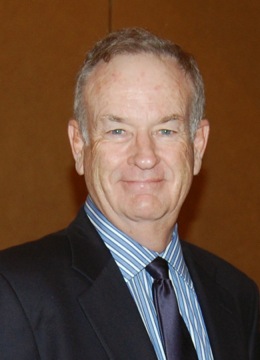
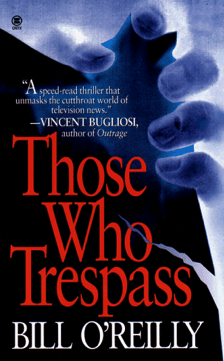
Note to readers: All of the trademark bombast and hyperbole were in place when Bill O’Reilly wrote his very first book in 1998. This one was a serial killer novel titled Those Who Trespass. And O’Reilly claimed to know where every last body was buried during his stop in Dallas to promote it. He’s since gone on to pen a long string of bestsellers, all of them in the non-fiction arena. Here’s how it all began for the recently ousted Fox News Channel personality.
This article was first published on July 2, 1998.
By ED BARK
@unclebarkycom on Twitter
Bill O’Reilly knows where the bodies are buried. This helps when your first novel’s protagonist is a vengeful TV journalist turned serial killer. “Everything in the book, except for the actual crimes, is true,” he says during a recent stop in Dallas to promote Those Who Trespass.
O’Reily, host of the Fox News Channel’s week-night The O’Reilly Factor, says television news is by and large a shark-infested cesspool. He’s been taking notes since the late 1970s, when he was a guppy in the Dallas-based WFAA-TV (Channel 8) newsroom.
“I started keeping diaries every day of what happened to me and the crazy things I saw, with an idea that someday this stuff is going to be golden . . . Diaries, diaries, diaries.”
They “piled up to the ceiling in my cellar” during O’Reilly’s careening career through ABC, CBS and the syndicated Inside Edition, which he anchored for six-and-a-half-years until March 1995. He then had six months to kill before beginning class at Harvard University’s Kennedy School of Government. Dear diary, seize the time.
“It was either go to the beach or bang out a book,” says O’Reily, who likes to get to the point quickly. “I didn’t want to do a whining, oh-it’s-a-terrible business book. I mean, guys out collecting garbage aren’t going to feel sorry for some national anchorman whining about how tough life is. So I figured I’d write a thriller.”
His resultant “novel of television and murder” is a swift, entertaining 288-page read without literary pretensions or genuflections. It’s O’Reilly’s way of sparing readers the boring details. To be or not to be . . . ah, shaddup.
“The reason I’ve been successful in every venue I’ve been in is because I speak for blue-collar America,” he says. “I think that way, I write that way. I don’t spend four pages describing the lampshade. I move it along, and people respond to that.”
By Page 7, womanizing White House correspondent Ron Costello already is breathing his last after being assaulted in a hotel room by a former colleague.
“No network can help you now,” he’s told. “You are an evil person. You hurt and use people. And now you are going to leave us in a rather painful way.”
Costello exits with a silver spoon in his mouth -- and through his brain stem. It’s a giant step beyond staring daggers.
“I’m getting standing ovations in local newsrooms around the country,” O’Reilly says. “They’re telling me to write another one quick. Kill more people! Fifty percent of people in television news management are what I call morally challenged. They will do whatever they believe they have to do to survive or prosper. And a lot of people get hurt . . . It’s like the Nazi Party. You have all these people trying to get up there so they can do whatever they wanna do. I’m not equating television executives with Nazis. But it’s the same kind of ‘I want to rule’ mentality.”
“I don’t think the business could get any more ruthless,” he adds. “Not unless Murder Inc. is going to buy a chain of television stations.”
Not that he’s Jonathan Livingston Seagull. O’Reilly admittedly has burned bridges, copped attitudes and taken his turns in the muck. Without cable, he might not have much of a job anymore. But on the fledgling Fox News Channel, his abrasive O’Reilly Factor is aftershave on a razor cut, iodine on an open wound. It works for him in times when too many interviewers come off as graduates of Namby Pamby U. That’s why O’Reilly says he told potential guest Tom Selleck to “take a walk” when he supposedly wanted to keep some subjects off limits.
“I’m not gonna sell myself out to try to get guests to come in,” he says. “That’s what’s corrupted the television news business. I don’t want to be friends with these people, all right? I’m not in the club, and they don’t want me in the club. They’d let me cut the front lawn, but they won’t invite me in for lunch. Fine.
“I don’t want to go to the Hamptons and schmooze with these people. Because then you won’t ask them the hard questions. Yeah, you’ll be able to wave your hand and get them to come over so you can interview them for 30 seconds about nothing. About zippo. But I firmly believe that my confrontational style is what people want. I never slay the guests so that they’re embarrassed. When I know I have them on the ropes, I go back to my corner. I’m not interested in destroying anybody. I am interested in getting to the truth.”
So there. O’Reilly, who dubs his show “Nightline with an attitude,” says he’ll continue to ask the questions Larry King won’t. He also tells viewers what he thinks, while Fox slaps an “Opinion” disclaimer on home screens.
“I enjoy the hell out of this,” he says. “This the best job I’ve ever had. I don’t care about protocol and I don’t have 15 ‘suits’ looking over my shoulder.”
He’s also writing a second book, this one on the world of tabloid TV. His years at Inside Edition served to prime the sump pump.
“It was like the Wild West. It was just a bunch of crazy guys running around,” he says. “I was the sane one. I mean, how frightening is that?”
Email comments or questions to: unclebarky@verizon.net
Rich Little makes a good first impression
28/10/16 09:01
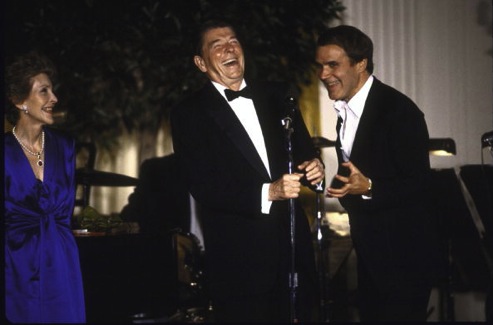
Note to readers: In November 2002, Rich Little blew through nine American presidents during a one-man, six-day show at the Majestic Theatre in downtown Dallas. He began with John F. Kennedy and ended with George W. Bush. Before The Presidents, Little sat down for an anecdote-loaded interview that dropped names ranging from Reagan to Richard Nixon to Johnny Carson, whom he briefly portrayed in the 1996 HBO movie The Late Shift. Little lately is supporting Donald Trump, in part because he thinks the country needs a dramatic change. More to the point, though, “From my perspective I’ll have a wealth of material,” Little told an interviewer in July during an engagement in Las Vegas.
This article was first published on Nov. 12, 2002.
By ED BARK
@unclebarkycom on Twitter
Rich Little once hung up on President Reagan, thinking he was an imposter doing a bad impression.
Johnny Carson once hung up on Jack Benny, thinking he was Rich Little.
And Rich Little still has a framed letter from an adoring fan who praised all of his great contributions to show business, particularly “Tutti-Frutti” and “Good Golly Miss Molly.” It was meant for Little Richard.
“Maybe he’s got some letters telling him, ‘Your John Wayne is outstanding,’ “ Little says. These stories and many more might someday be in a book he’s been messing around with for the last five years. Tentative title: People I Have Known or Been.
“True stories. Well, what you don’t remember you make up. But basically they’re true.”
Makeup is essential for The Presidents, which begins a six-day run at the Majestic Theatre Tuesday night. Billed as both “touching and hilarious,” it stars Little as the last nine American presidents, beginning with John F. Kennedy. Gerald Ford’s former press secretary, Ron Nessen, co-wrote the script for a production that includes four other actors in supporting roles, principally Ginger Grace as all of the First Ladies. For his part(s), Little will be juggling wigs, fake noses and various other adornments in a game effort to keep looking presidential.
“Each time it’s done in less than two minutes,” he says. “And when you go from Kennedy to LBJ, that’s a big change. You don’t want the nose to fall off in the middle of a scene.”
Trim, tanned and jocular, Little is a nicely preserved 63-year-old who’s been doing impressions for his entire adult life. Canadian by birth, his first American TV appearance was in 1964 on Judy Garland’s acclaimed but short-lived CBS variety show.
“So I came along at the right time for me, and got my name pretty well known by doing a lot of television,” he says. “Today I don’t do any television because when you get over 50 they don’t want you.”
Little was just shy of his 25th birthday, and getting a pair of pants fitted at a Canada tailor shop, when he heard the news of President Kennedy’s assassination in Dallas. A popular young Kennedy impressionist named Vaughn Meader saw his gainful career end overnight.
“After the assassination, the comedy was over,” Little says. “You can imitate and make fun of people that die a natural death or get older or whatever. When you’re tragically killed, though, the humor really goes away. So we do Kennedy in the context of history. It’s not a Saturday Night Live spoof. It’s a history lesson, a true portrayal with a lot of the humor coming out of the paranoia of a couple of presidents and the idiosyncrasies of others.
“It’s a slight exaggeration of facts, like (Richard) Nixon going over his enemies list or Kennedy talking to Marilyn Monroe while trying to work on the Bay of Pigs situation and getting the phone lines mixed up. That’s funny. It probably never happened, but you never know.”
Little has met a majority of the presidents he’s portraying. Ford is the toughest to flesh out, he says.
“Not too exciting. A nice man, though. I told him I was going to be doing this show. And he said, ‘Well, I don’t know. Is there any tripping or falling?’ I said, ‘No.’ He said, ‘OK, I’ll come.’ “
Reagan, whom Little considers a pal, “was a little vague and a little out to lunch even back then as president . . . He loved to tell jokes and talk about his movies. He’d tell me these long, involved jokes. Sometimes they’d go nowhere, and there was no punch line.
“One time he wanted to know how my impression of him was coming along. I told him that his head is always bobbing and he looks down a lot. And he said, ‘Well, you’d look down, too, if you owned a horse ranch.’ “
He first met Nixon at a garden party in California several years before Watergate undid his presidency.
“Debbie Reynolds just literally threw me at the president and said, ‘Rich is going to do you.’ I don’t know what he thought of that. I started to do him, and he didn’t have a clue that I was doing him. He just looked at me and said, ‘Who’s this? Why’s he talking like this?’ He must have thought I was a complete lunatic.”
But seriously, folks, Little has an even better Nixon story, this one told to him by a friend who owned a Mexican restaurant in San Diego.
“Nixon loved Mexican food, so he went there for lunch. When he finished, he suddenly stood up and said, ‘Can I have your attention, please? I have an announcement. I would like to congratulate you on an excellent beefy taco.’
“An excellent beefy taco! That’s hysterical! That’s all he had to say! That is so typically Nixon.”
Little encountered Bill Clinton at a fundraiser in Las Vegas.
“ ‘I’m afraid to meet you,’ he told me. ‘God knows what you’re doing to me.’
“And I said, ‘Well, you’ve written me a lot of good material.’ And he laughed at that.”
Little’s catalog of impressions numbers about 200, some of them all but retired.
“Oh yeah, my Spiro Agnew and George McGovern aren’t too popular right now,” Little says, referring to Nixon’s first vice president and the 1972 Democratic presidential nominee.
On request, he does Agnew anyway -- for the first time in 30 years: “Let me give you a little background on myself and clarify the discrepancies promulgated by those who close their eyes to the pernicious influence of the spirit of national masochism encouraged by an effete corps of impudent snobs.”
There’s a kicker.
“I have no idea why, but that was Jack Benny’s favorite impression. He’d say, ‘Give me a little Spiro. God, that Spiro Agnew kills me.’ “
Some impressions still elude Little. He perfected the late Steve Allen’s laugh, but could never nail the voice. “And I can’t do Ed McMahon either except for the ‘Ho ho ho.’
“A lot of the film stars of today I’m not imitating,” he adds. “They’re impossible to do. How do you do Tom Hanks or Tom Cruise or even Harrison Ford? There’s not a lot of call for Jon Voight either, and my Val Kllmer isn’t too exciting . . . Dr. Ruth Westheimer, Ross Perot and Truman Capote -- they came in about five minutes. They already were caricatures. Jack Nicholson’s easy to do, too. But Robert Redford, how would you do that? I have no idea. And even if you did him well, people wouldn’t respond.”
Little later seizes an opening when his interviewer foolishly tells him that everyone thinks he can do at least one impression. This leads to a very lame attempt to do Howard Cosell while the master feigns approval. Far better to end with another of Little’s show biz stories.
“I once did a benefit where Gerald Ford and Frank Sinatra were in the front row. I had a podium made out of cork so I could trip into it and it would fall apart. I overdid it. I hit that podium so hard that it flew into a million pieces and I fell off the stage and landed in Gerald Ford’s lap!
“And cork’s coming down and Frank’s pounding the floor scuh-reaming with laughter. And I put the mic up to Gerald Ford and he goes, ‘Whoops.’
“Frank and I became friends after that. He liked anyone who could make him laugh, and he thought that was the funniest thing he’s ever seen. Gerald Ford got a great kick out of it, too.”
Pause, one-two. “Anyway . . .”
Email comments or questions to: unclebarky@verizon.net
